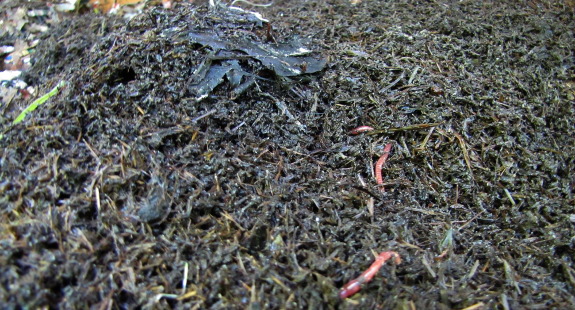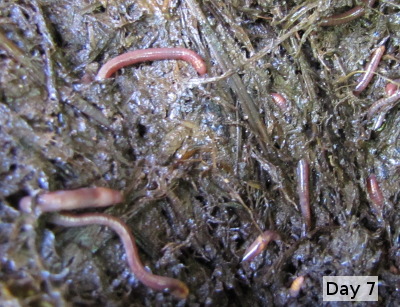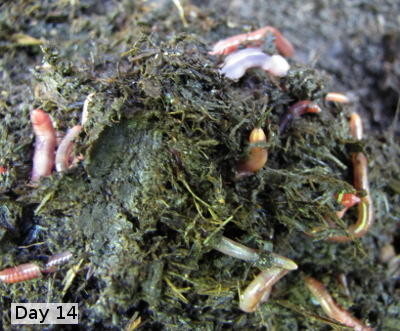
Happy worms

I've been mulling over
our school worm bin project ever since I
pronounced it a failure, and I think one of the
reasons I found it so easy to throw in the towel is because the worms
just weren't happy. The school food that ended up on our farm
seemed to be slightly better than what I was served as a student, but
it was still overly processed, starchy, and oily, and the worms were
lingering rather than multiplying on such substandard fare. I
didn't realize this at the time --- I just had a sinking feeling in the
pit of my stomach every time I opened the worm bin lid after the first
month or so.
 After the school food stopped
coming, I tossed ten gallons of moderately fresh horse manure in the
bin, then another ten gallons two weeks later. The worms quickly
migrated up into the manure and their population exploded. The
two and a half week old manure is still full of worms, but its
appearance has already changed over to nearly pure castings (the photo
at the top of the page), in stark contrast to the three month old food
scraps in which I can still pick out the shape of the food. So
this is what a healthy worm bin is supposed to look like!
After the school food stopped
coming, I tossed ten gallons of moderately fresh horse manure in the
bin, then another ten gallons two weeks later. The worms quickly
migrated up into the manure and their population exploded. The
two and a half week old manure is still full of worms, but its
appearance has already changed over to nearly pure castings (the photo
at the top of the page), in stark contrast to the three month old food
scraps in which I can still pick out the shape of the food. So
this is what a healthy worm bin is supposed to look like!
For future reference, I
had tried to pick out the most worm-worthy food to put in the bin, but
there just wasn't much of it, and this is what I'd been feeding the
worms (in rough order of amount):
- mashed potatoes
- green beans
- bread
- hamburgers
- french fries
- corn
- apples
- peas
- carrots
- salad
- pickles
 You
would have thought that the worms would have at least been pleased with
the fruits and vegetables, but the truth is that the only thing they
actually seemed to be enjoying was fresh spinach. The mashed
potatoes, especially, caused anaerobic pockets that quickly turned
moldy and that the worms fled from.
You
would have thought that the worms would have at least been pleased with
the fruits and vegetables, but the truth is that the only thing they
actually seemed to be enjoying was fresh spinach. The mashed
potatoes, especially, caused anaerobic pockets that quickly turned
moldy and that the worms fled from.
The moral of the story
is that run of the mill food scraps aren't very healthy for
worms. Makes you wonder, though --- if the worms won't eat this
food, should our community's children?
Want more in-depth information? Browse through our books.
Or explore more posts by date or by subject.
About us: Anna Hess and Mark Hamilton spent over a decade living self-sufficiently in the mountains of Virginia before moving north to start over from scratch in the foothills of Ohio. They've experimented with permaculture, no-till gardening, trailersteading, home-based microbusinesses and much more, writing about their adventures in both blogs and books.
Want to be notified when new comments are posted on this page? Click on the RSS button after you add a comment to subscribe to the comment feed, or simply check the box beside "email replies to me" while writing your comment.

You're totally right --- I have no clue what people actually eat just from looking at their cart. That's why I'm a bad shopper.
I also know what you mean about the grocery store produce. We had to buy some broccoli there last week because we were so low on veggies in the garden and I was shocked at how awful it was. I can't figure out if grocery store veggies were always so bad and I never noticed until I was spoiled from homegrown vegetables, or if there's been a real decline in quality.
I'm curious about your addition of horse manure to your worm bin. I'm wondering if all that food just needed an additional carbon source like straw or wood shavings to balance out all food. In my own compost bin, I try to layer leaves, grass clippings, and even a scoop of soil when I add a lot of food, and this seems to help things break down better. I would expect that the worms would benefit from other filler and bedding as well. I know that you were adding shredded paper, but perhaps it wasn't enough to balance all the food. I have been planning a worm bin for later this summer, so I'm curious if what you think may have been done to make your experiment successful.
Bentley over at redwormcomposting.com has actually had a similar failure from getting food waste from a local restaurant (see http://www.redwormcomposting.com/large-scale-vermicomposting/vermicomposting-trenches-revisited/) But in the process, he has developed the idea of building vermicomposting trenches to handle all of the composting food and additional materials. As the pile breaks down and nutrients are released into the soil, it benefits the nearby plants, which can be planted right next to the trench. Sounds like a very interesting idea! (I am always intrigued by reducing work... you never have to dig and move the compost since it is right where you want it)
The amount of carbon wasn't a problem --- I layered shredded paper above, below, and around the food waste. However, the type of carbon might have been. They seemed to like shredded newspaper better than the other types of paper and cardboard I sometimes had to use.
You might be interested in worm towers as a low work way of getting worm castings into the garden. I've considered giving it a try, but I'm 99% sure I'd just end up with our dog tearing up the whole garden bed to get to the food scraps.
I tried it out two different times and what I eventually decided was that it was taking up too much of my time to produce such a small amount of compost. I produce about 55 gallons of compost every 3 months via my normal composting methods and it takes me no time and costs me nothing and I don't have to shred paper or cardboard.
But I do still believe in worms. I use them as an indicator of soil health. When I till ground for the first time I notice that the worms are very small and not very energetic. They also are never located in the top inch of the soil, they're usually a few inches down. But when I work the soil in my established beds I find more worms and they are big and fat and they are moving their behinds to get out of my way. So I still love 'em, I just choose not to baby them anymore.
I'm sure many are very happy with vermicomposting, especially those in small apartments. But I have a huge garden and need a lot of compost. So I don't bother with it anymore.